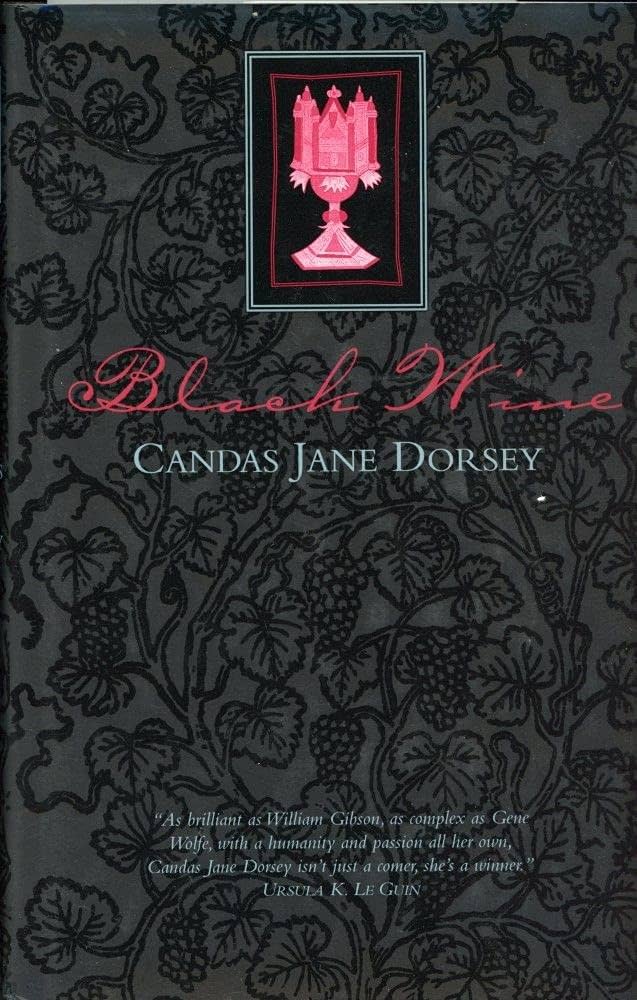“Women who transgress. Who don’t take from others and be slaves for it. Who stand up and say no.”

Year published: 1996
Categories: Adult, fantasy, dystopian
LGBTQIA representation: (F/M/M and F/F, main character, another perspective character and their partners)
Summary: Why is there an old woman, in a hanging cage for punishment, keeping a journal written in blood? Candas Jane Dorsey has written an ambitious, feminist novel about women coming to terms with their identity in a barbarous fantasy world. Dorsey’s women travel across the world, from the slave dens to the merchant cities, across seas by ship and by dirigible, to isolated mountain villages and back again. But there remains provocative ambiguity as the story progresses. There is a woman exiled from her family, a mother who has abandoned her daughter, an old woman in a cage, a young women slave on a lord’s estate who does not remember her past. How many of them are the same woman?
My Thoughts: this is an extremely unique one. I’ve never read anything quite like it, and I don’t expect to read anything very similar ever again. It’s probably one of the darkest books I’ve read in a long time, but I think that darkness is put to good use in creating something truly bold and original.
Each perspective in Black Wine is utterly unique, but they end up forming a greater whole that is truly magnificent. You know how there’s that massive reveal in The Fifth Season regarding the identities of the three narrators? Well, this book has awesome reveals like that several times over -the realization that the enslaved waif is Essa, the realization that the journal perspective is Ea’s, and then that the old woman in the cage is Ea. It was really fun gradually piecing things together and seeing the story threads weave into a pattern that made sense.
The story’s world is also really interesting – some places have electricity, gene mapping and neurosurgery while we also have people living in isolated villages and executing transgressors by hanging. Each place has its own culture and customs, with the main focus being the customs about touch, formality and sexuality. There’s a scene where several women from different places are summoned by the Carrier of the Dead and speak about what they consider perversity, each with a drastically different idea. There is no conceptualization of rape or consent in the Dark Isles. There are little touches of difference like the tradition of handfasting polycules or the universal use of the name Minh with different pronunciations and emphases.
Another central theme is language and how it connects us – sharing a tongue binds the waif to the old woman in the cage, and the waif learns about the liberatory power of language for the enslaved from a slave whose name she interprets as Escape-from-bondage. Language is what sets off revolution in the Dark Isles.
This is also a story about how we live on through brutality in different ways, especially in the case of women who transgress. The waif and Escapes-from-bondage decide that consensual sex is a “slave rebellion,” to put it in the waif’s terms. XX (Escapes-from-bondage) ultimately finds that he has to return to the Dark Isles at the end of the story because his work there is incomplete; Ea ultimately just wanders off, mind broken by what she has experienced, and Essa realizes that she never really got her mother back in a really bittersweet turn of events. Black Wine also makes it clear that the fight against brutality can simply lead to more violence in turn – the revolution in the Dark Isles leads to despotism on the part of the new government, which leads to utter decimation in another rebellion.
On this theme of living on through brutality in different ways, one of my favorite bits of the book is the conversation between XX and Essa at the end of the book, where they talk about the way she tried to sleep with him when they were both still in the Dark Isles. Essa’s privilege and naivety led to her presuming upon him; she couldn’t understand how different his experience of the world was, the power she held over him, and the way that their relationship changed when she stopped being the waif. Even though she had no bad intentions, she still hurt him with her presumption.
If it isn’t clear from everything I’ve talked about so far, this book is extremely brutal. While I could generally deal with it, there were a few places where it became a bit much for me; everything to do with Ea’s monstrous grandmother is just A Lot, especially with her treatment of the slaves that she tortures to death and lobotomizes etc. There are a couple of things that aren’t necessarily too brutal but just didn’t work for me at all, like the part where the sisters with the incestuous relationship were painting on each other with menstrual blood and the bit about white people being discriminated against. There are also lots of relationships that develop very quickly and get dropped and lots of coincidences, like Essa ending up where Ea is in the cage and them finding each other later while walking down the road. Finally, I just do not understand what happened at the very ending of the book at all!!
I can’t remember how I first heard about this book but I think it might have been in an r/fantasy thread where I was asking for recs of books similar to Planescape: Torment. If so, I can definitely see the comparison; if not, who knows! If you’re looking for an utterly weird and disconcerting read, this is a good fit. Weak stomachs, stay away.

Leave a comment